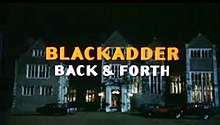Blackadder: Back & Forth
| Blackadder: Back & Forth | |
|---|---|
 |
|
| Directed by | Paul Weiland |
| Produced by | Peter Bennett-Jones Geoffrey Perkins |
| Written by |
Richard Curtis Ben Elton Rowan Atkinson |
| Starring |
Rowan Atkinson Tony Robinson Stephen Fry Hugh Laurie Tim McInnerny Miranda Richardson Patsy Byrne Rik Mayall Kate Moss Colin Firth |
| Music by | Howard Goodall |
| Cinematography | Tony Pierce-Roberts |
| Edited by | Guy Bensley |
|
Production
company |
|
| Distributed by |
Sky (Theatrical) BBC Worldwide (VCI Home Video) |
|
Release date
|
|
|
Running time
|
33 minutes |
| Country | United Kingdom |
| Language | English |
| Budget | £3 million |
Blackadder: Back & Forth is a 1999 sci-fi comedy film based on the BBC period sitcom Blackadder that marks the end of the Blackadder saga. It was commissioned for showing in the specially built 'SkyScape' cinema, erected southeast of the Millennium Dome on the Greenwich peninsula in South London. The film follows Lord Edmund Blackadder and his idiotic servant, Baldrick, on a time travel adventure that brings the characters into contact with several figures significant to British history.
In a 1999 interview, Richard Curtis described it as "an irreverent trek through British history – a time travel adventure story consisting entirely of people who are either rude or stupid."Rowan Atkinson and Tony Robinson reprised their roles as the series' core characters Blackadder and Baldrick, respectively. In an interview, Atkinson stated that making a Blackadder film had always been an ambition. Joining Atkinson and Robinson are other main cast members from the last three series, Stephen Fry, Hugh Laurie, Tim McInnerny and Miranda Richardson.
Blackadder: Back & Forth was produced almost 10 years after the final episode of the Blackadder television series, but reunited almost the entire cast and writers of series 2–4 of the television programme, with the exception of the original series producer, John Lloyd. Due to the increased budget, it is the only Blackadder story to be shot entirely on film and with no laugh track, although one was added for the BBC One broadcast in 2002. It is also the only Blackadder to be filmed in widescreen; 2.20:1 aspect ratio for cinema showings, and 16:9 (1.77:1) for the DVD and television screenings.
...
Wikipedia
